The Criterion Channel’s May 2021 Lineup

The Criterion Channel’s May 2021 Lineup
Next month, the Criterion Channel celebrates independent, pathbreaking, and underappreciated artists. We’ve got a retrospective devoted to Gena Rowlands (pictured), the indie-film legend whose acting blurred the line between life and performance; a centenary tribute to the great Bengali humanist Satyajit Ray, whose revelatory films brought Indian cinema to international attention; spotlights on blacklisted screenwriter Dalton Trumbo and brilliant Hollywood craftsman Mitchell Leisen; and so much more.
If you haven’t signed up yet, head to CriterionChannel.com and get a 7-day free trial.
** indicates programming available only in the U.S.
FEATURED SERIES
PREMIERING MAY 1
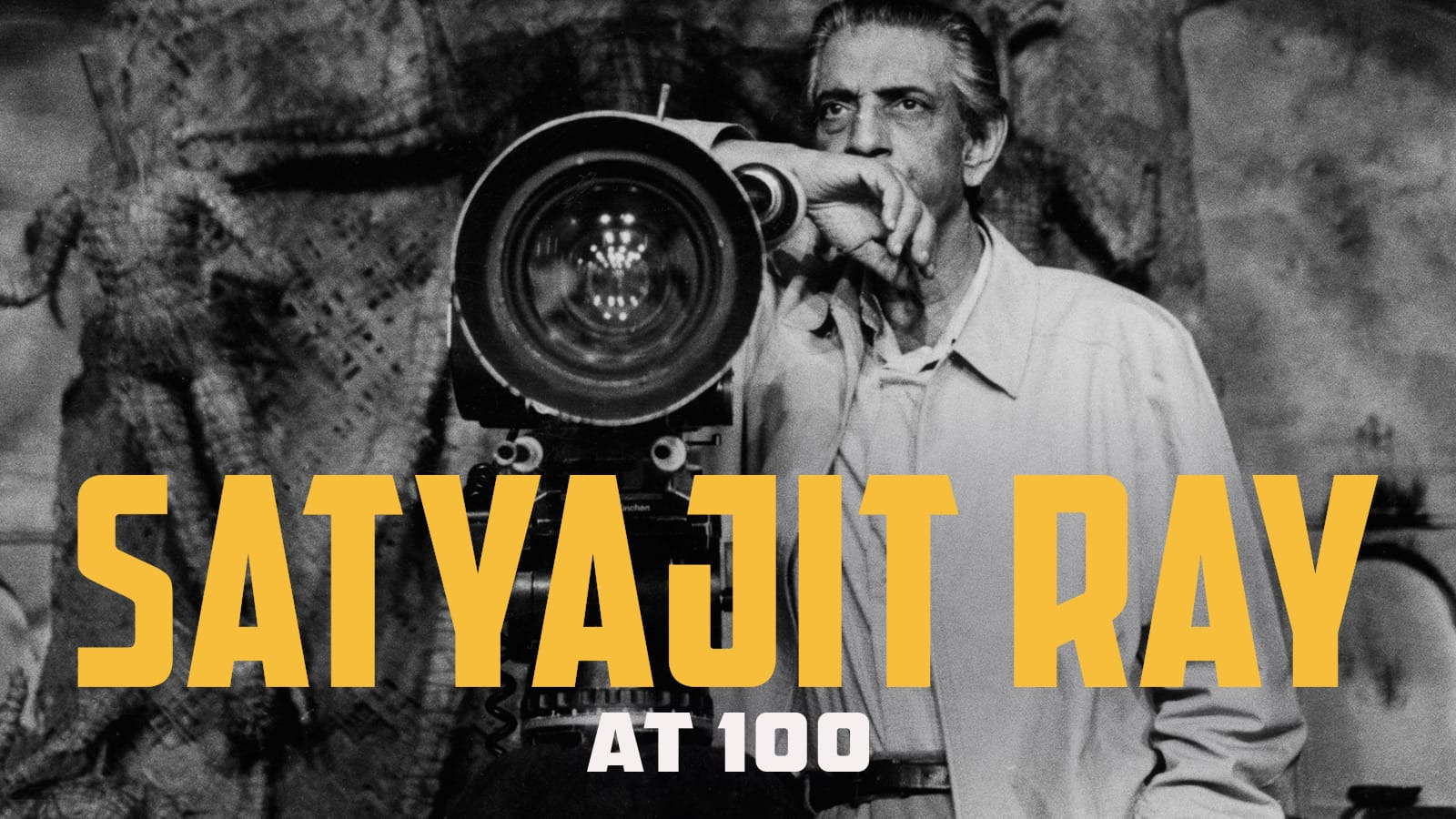
Satyajit Ray at 100
Featuring Shyam Benegal’s 1984 feature documentary Satyajit Ray
“Not to have seen the cinema of Satyajit Ray means existing in the world without seeing the sun or the moon,” observed Akira Kurosawa with regards to the Indian master who would have turned one hundred this May. Influenced by the poetic humanism of Jean Renoir and the Italian neorealist movement, Ray self-financed his landmark debut Pather Panchali—the first installment of his internationally celebrated Apu Trilogy, a cycle of richly humane masterworks that traces its title character’s journey from boyhood to maturity. Over the course of a long, remarkably varied career that encompassed forays into a wide array of genres—including period pieces, comedies, detective mysteries, and documentaries—Ray applied his compassionate, lyrical vision to explorations of female liberation (The Big City, Charulata), the clash between tradition and modernity (The Music Room), and the impact of British colonialism (The Chess Players). Overflowing with humanity, humor, and some of the most exquisite images in all of cinema, Ray’s films are nothing short of essential.
Featuring: Pather Panchali (1955), Aparajito (1956), The Music Room (1958), Apur Sansar (1959), Devi (1960), Rabindranath Tagore (1961), Three Daughters (1961), The Big City (1963), Charulata (1964), The Coward (1965), The Holy Man (1965), The Hero (1966), The Chess Players (1977), The Elephant God (1979), The Home and the World (1984), An Enemy of the People (1989), The Stranger (1991)
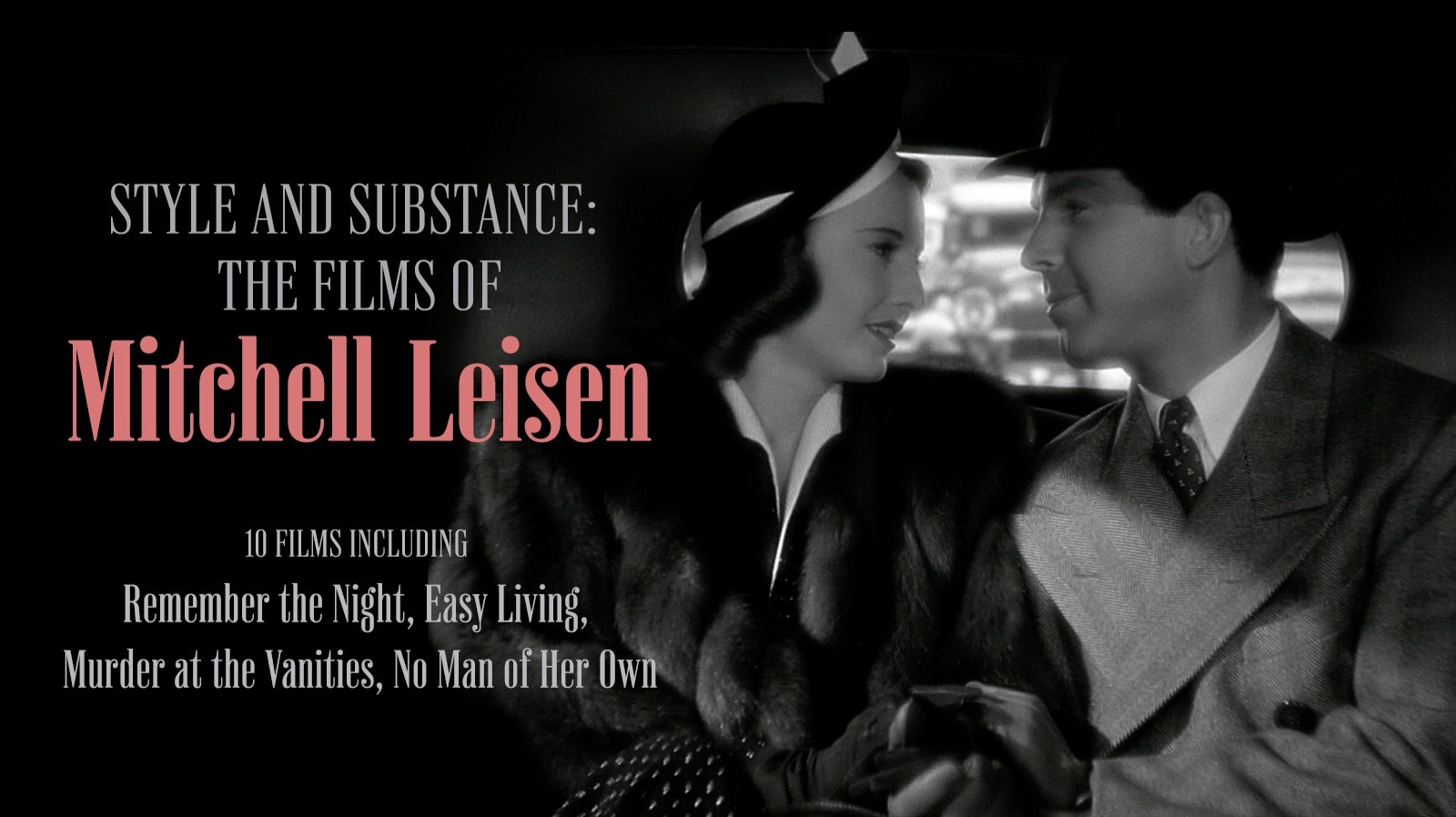
Directed by Mitchell Leisen
Though Mitchell Leisen’s name is less well-remembered today than those of his flashier Paramount colleagues Billy Wilder and Preston Sturges—both of whom Leisen helmed scripts by before they got their own shot in the director’s chair—he was a true cinematic artist who brought an unmistakeable elegance, sophistication, and genuine depth of feeling to every project he touched. One of the very few gay filmmakers to work as an A-list director in studio-era Hollywood, Leisen showed a facility for a wide range of genres, lending his impeccable taste and finesse to the outré pre-Code musical Murder at the Vanities, the sparkling romantic comedies Easy Living and Remember the Night, the masterfully moving melodrama To Each His Own, and the unsung protofeminist noir No Man of Her Own. He was also one of the golden age’s foremost directors of women, with stars like Barbara Stanwyck, Jean Arthur, Olivia de Havilland, Carole Lombard, and Claudette Colbert all giving some of their finest, most radiant performances under his sensitive, unerringly refined direction.
Featuring: Death Takes a Holiday (1934), Murder at the Vanities (1934), Hands Across the Table (1935)*, Easy Living (1937), Midnight (1939), Remember the Night (1940), Kitty (1945), To Each His Own (1946), No Man of Her Own (1950), Darling, How Could You! (1951)

Starring Gena Rowlands
Gena Rowlands forever changed the face of screen acting with her raw emotional realism and immersive approach to performance, which blurred the lines between actor and character to the point of no return. Fearlessly exploring the extreme edges of human relationships and emotion in films like the shattering marital X-ray Faces, harrowing mental-illness drama A Woman Under the Influence, and offbeat thriller Gloria, Rowlands brought a searing psychological intensity and edgy unpredictability to her portrayals of complicated, troubled, fully alive women. Bringing together her landmark collaborations with her husband, the revolutionary independent filmmaker John Cassavetes, alongside a selection of her work before (Lonely Are the Brave) and after (Night on Earth), this tribute to Rowlands’s artistry is rich with some of the most dynamic performances in all of twentieth-century cinema.
Featuring: Shadows (1959), Lonely Are the Brave (1962), Faces (1968), Machine Gun McCain (1969), Minnie and Moskowitz (1971), A Woman Under the Influence (1974), Opening Night (1977), Gloria (1980), Tempest (1982), Night on Earth (1991)
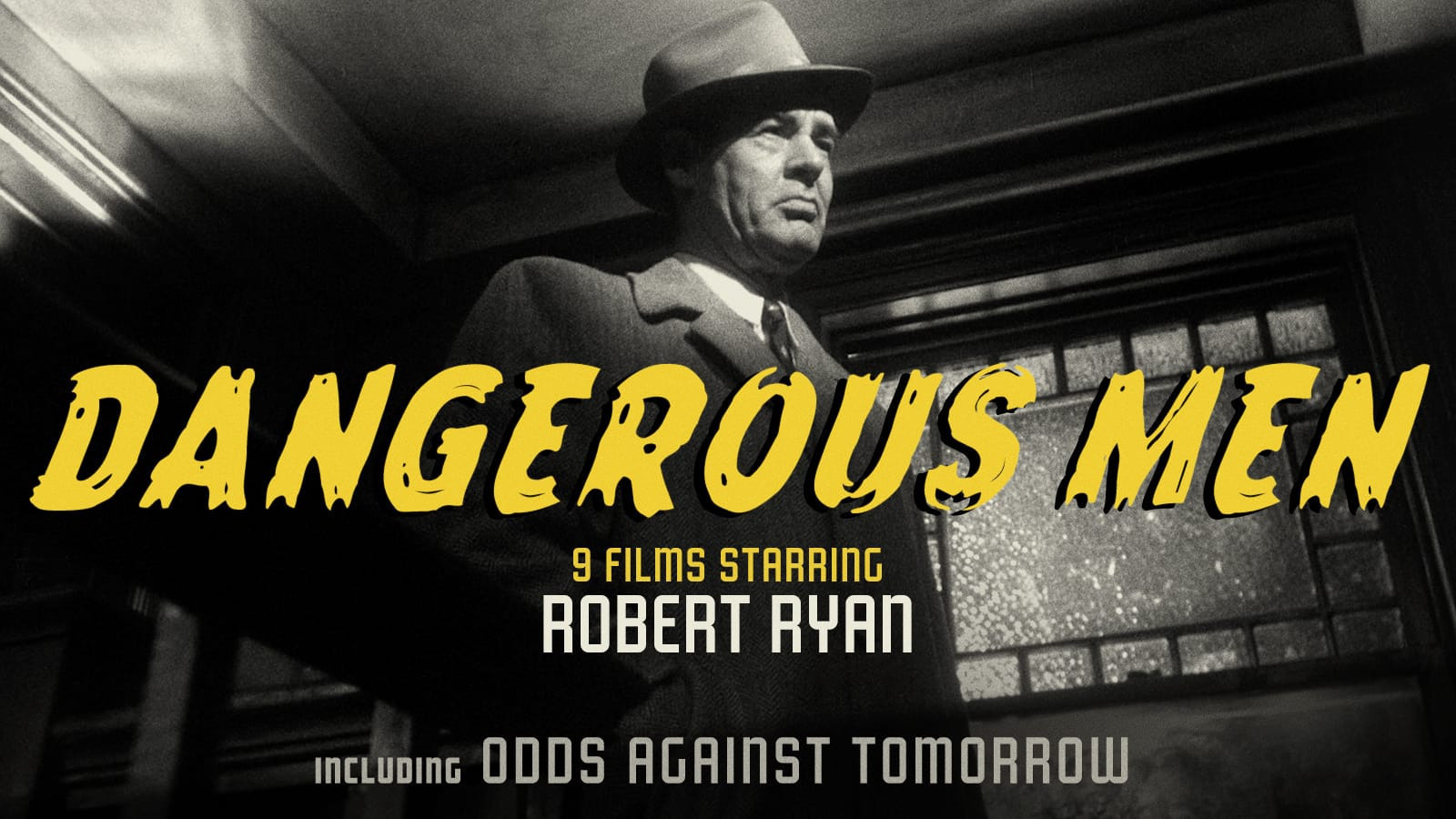
Starring Robert Ryan
Featuring a new introduction by critic Imogen Sara Smith
Robert Ryan burst on the scene after World War II, bringing raw emotional and physical power and subtle intelligence to some of the darkest and toughest films of the postwar era. A master of harrowing inner conflict and barely suppressed rage, Ryan created an indelible gallery of tightly wound bullies, brooding killers, and honorable but tormented heroes. Offscreen, the man known for his searing portraits of racists and bigots was a passionate progressive and a deeply private family man; his keen insight into the roots of prejudice made his performances a form of activism, as his friend (and his Odds Against Tomorrow costar) Harry Belafonte noted. An essential actor in film noir, Ryan embodied lonely and violent men with compassion and fearless honesty.
Featuring: Crossfire (1947), Caught (1949), The Set-Up (1949), On Dangerous Ground (1951), Clash by Night (1952)*, Bad Day at Black Rock (1955)**, Men in War (1957)*, Odds Against Tomorrow (1959), The Wild Bunch (1969)
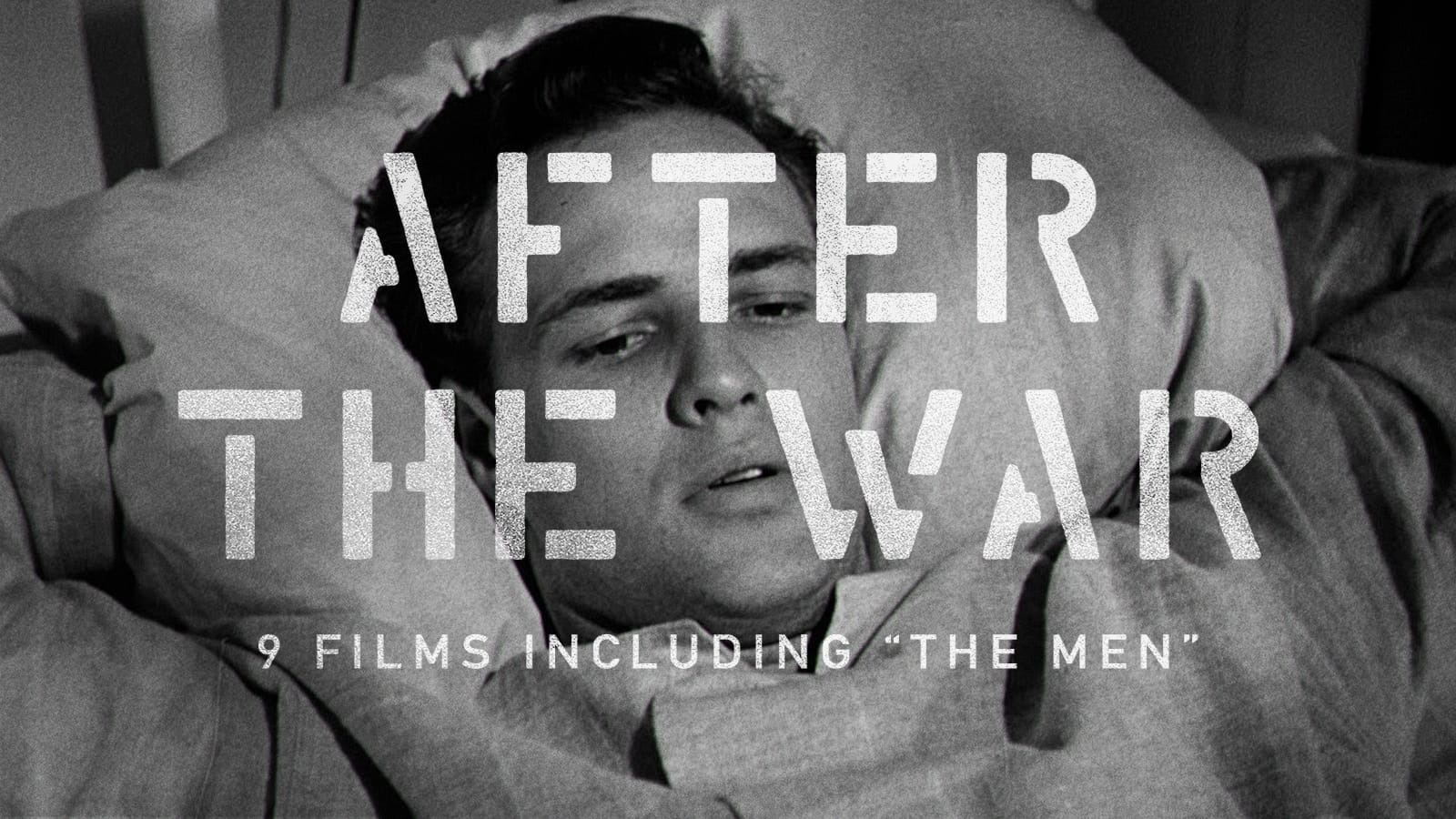
After the War
What happens when a war ends? For soldiers who return home from overseas, the fight is often far from finished. By turns candid, humane, surreal, and humorous, these explorations of the struggles that veterans face in rejoining society show the injuries, PTSD, and feelings of rootlessness, anger, and alienation that they must contend with. Though they may be set far from the explicit horrors of the front lines, these films—made in response to World War II (The Men, The Man in the Gray Flannel Suit), the Korean War (Lilith), and Vietnam (Welcome Home Soldier Boys, The Last Detail)—are potent indictments of the ravages of war.
Featuring: The Blue Dahlia (1946), The Razor’s Edge (1946), The Men (1950), The Idiot (1951), The Man in the Gray Flannel Suit (1956), Lilith (1964), Welcome Home Soldier Boys (1972), The Last Detail (1973), Deathdream (1974)

Directed by Lois Weber
Featuring a new introduction by critic Pamela Hutchinson
Trailblazing writer and director Lois Weber combined technical mastery, creative control, and thematic daring to become arguably the first auteur in film history. Tackling controversial subjects such as sex work and birth control, Weber put forward a strikingly personal, ahead-of-its-time vision in films like The Dumb Girl of Portici, the first epic directed by a woman and the only feature film to star legendary ballet superstar Anna Pavlova; Shoes, a remarkable proto-neorealist study of poverty; and The Blot, a class-conscious romantic melodrama often cited as her masterpiece. Though a giant in her time—she ran her own studio, was the first woman director accepted into the Academy of Motion Picture Arts and Sciences, and at one point was the highest-paid director in Hollywood—her radically progressive body of work was obscured by the male-dominated consolidation of the studio system, making it now ripe for rediscovery.
Features: The Dumb Girl of Portici (1916), Shoes (1916), The Blot (1921)
Shorts: Suspense (1913), Discontent (1916)

Written by Dalton Trumbo
Featuring Peter Askin and Christopher Trumbo’s 2007 documentary on Trumbo’s life and work
Perhaps no figure represents the indignities suffered by the victims of the Hollywood blacklist more fully than Dalton Trumbo. Having established himself as one of the industry’s most talented screenwriters with his scripts for popular successes like Kitty Foyle and Thirty Seconds over Tokyo, Trumbo found his career abruptly derailed when, in 1947, he refused to testify before the House Un-American Activities Committee regarding his left-wing political beliefs, making him one of the most prominent members of the so-called Hollywood Ten, who were imprisoned and then barred from working within the studio system. For the next decade, Trumbo continued to work secretly using a variety of pseudonyms and other screenwriters as fronts, penning classics like Gun Crazy, He Ran All the Way, and Roman Holiday (the last of which won an Academy Award for best story that was only awarded to Trumbo years after his death). Readmitted to the industry in the early sixties, he delivered a screenplay for Stanley Kubrick’s Spartacus that thundered with conviction. Today, Trumbo’s name is synonymous with the injustices of political persecution—and the courage it took to resist during one of the darkest chapters in American history.
Featuring: Kitty Foyle (1940)**, Thirty Seconds over Tokyo (1944), Our Vines Have Tender Grapes (1945), Gun Crazy (1950), He Ran All the Way (1951), Roman Holiday (1953)**, The Green-Eyed Blonde (1957), Cowboy (1958), Spartacus (1960), The Last Sunset (1961), Lonely Are the Brave (1962)
Criterion Collection Editions
Premiering MAY 1

Dance, Girl, Dance (Dorothy Arzner, 1940)
Criterion Collection Edition #1028
Dorothy Arzner, the sole woman to work as a director in the Hollywood studio system of the 1930s and early ’40s, brings a subversive feminist sensibility to this juicily entertaining backstage melodrama.
SUPPLEMENTAL FEATURES: An introduction by critic B. Ruby Rich and an interview with filmmaker Francis Ford Coppola.

Girlfriends (Claudia Weill, 1978)
Criterion Collection Edition #1055
A wonder of American independent cinema by Claudia Weill, Girlfriends captures the complexities and contradictions of women’s lives and relationships with wry humor and refreshing frankness.
SUPPLEMENTAL FEATURES: Interviews with Weill and actors Melanie Mayron, Christopher Guest, and Bob Balaban; the short films Joyce at 34 and Commuters, both codirected by Weill; and more.
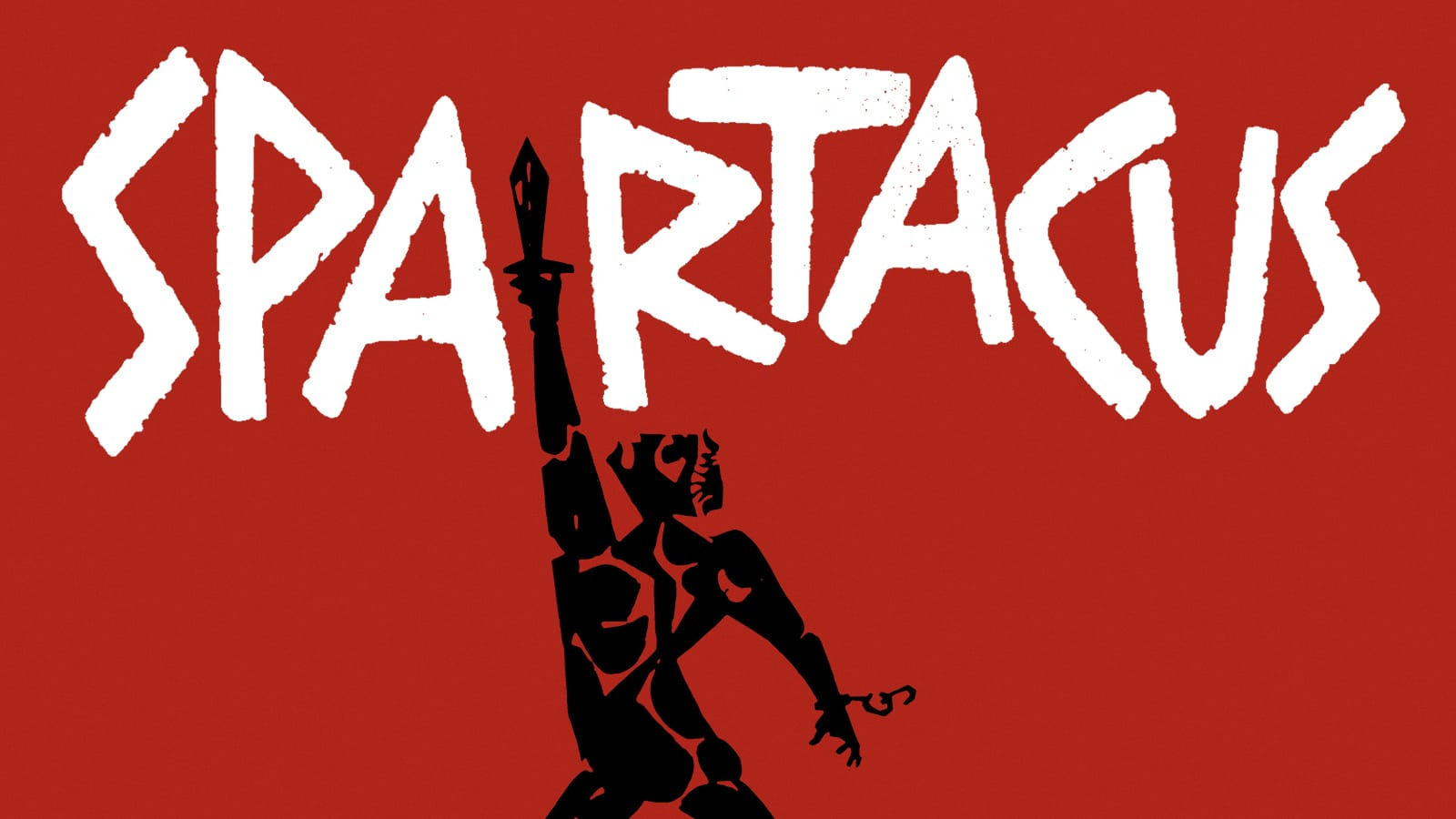
Spartacus (Stanley Kubrick, 1960)
Criterion Collection Edition #105
Stanley Kubrick takes the sword-and-sandals epic to new heights with this still-thrilling pop-culture touchstone scripted by Dalton Trumbo and starring Kirk Douglas.
SUPPLEMENTAL FEATURES: Audio commentary featuring Douglas, actor Peter Ustinov, designer Saul Bass, and others; deleted scenes; the 1960 documentary The Hollywood Ten; and more.
Criterion Originals
premiering may 1

Observations on Film Art #42: Paths and Roads in Pather Panchali
SATURDAY, MAY 1
With his extraordinary debut feature, Pather Panchali, Satyajit Ray introduced the world to his poetic, humanist vision and to the indelible story of Apu, the young Bengali boy whose odyssey he would trace over two subsequent films. In this edition of Observations on Film Art, Professor Kristin Thompson considers the film’s title—which translates to “Song of the Little Road”—and the subtle but complex motif of paths and roads that runs through the film. More than just a metaphor for life’s winding journey, Ray uses this visual theme—which includes the film’s famous railroad imagery—to enrich our understanding of Apu, his family members, their relationships to one another, and their unforgettable world.
Exclusive Streaming Premieres

Fire Will Come**
SATURDAY, MAY 1
After serving two years in prison for arson, Amador (Amador Arias) returns to his mountainside village in northwest Spain, where he resumes a serene, if mostly solitary, existence tending cabbages and injured cows with his aging mother, Benedicta (Benedicta Sánchez). Their life together resumes, guided by the rhythms of nature, despite the suspicious glares of the unforgiving locals—until one night when long-smoldering tensions are set ablaze. Winner of the Un Certain Regard Jury Prize at the 2019 Cannes Film Festival, the third feature from Oliver Laxe (Mimosas) is a mesmerizing meditation on the uncontrollable forces of nature and their effects on human lives.

What Happened Was . . .
THURSDAY, MAY 6
A lost masterpiece of 1990s independent cinema reemerges in a new restoration. Winner of the Grand Jury Prize and the screenwriting award at the 1994 Sundance Film Festival, What Happened Was . . . is Tom Noonan’s singular directorial debut: a darkly humorous take on dating dread that borders on the surreal. Featuring extraordinary performances by Noonan and Karen Sillas as two lonely hearts spending one claustrophobic Friday night together in an imposing apartment, this expressionistically rendered pas de deux—a noted favorite of Charlie Kaufman, who has called it “wildly heartbreaking and terribly funny”—exposes with startling clarity the myriad ways in which people struggle to connect.
Three Dimensions

Three Starring George Segal
THURSDAY, MAY 13
“What you get with George is masculinity and sensitivity, plus a brain,” remarked director Mike Nichols with regards to the late George Segal, who passed away in March. With his handsome good looks, appealingly down-to-earth screen presence, and ability to play across drama and comedy, Segal became one of the most popular stars of the 1970s and an avatar of the era’s changing social attitudes. This selection of three of his most memorable films—the gritty POW drama King Rat, offbeat caper The Hot Rock, and freewheeling gambling comedy California Split—showcase Segal’s easygoing charm and remarkable range.
Featuring: King Rat (1965), The Hot Rock (1972), California Split (1974)
TRUE STORIES

The Lives of Artists: Five Films by Michael Almereyda
MONDAY, MAY 3
One of the most consistently inventive, impossible-to-categorize directors of our time, Michael Almereyda (Tesla) has shown a fascination with idiosyncratic characters and visionary creators across both his narrative and documentary films. This selection of Almereyda’s nonfiction work brings together a candid portrait of legendary photographer William Eggleston (William Eggleston in the Real World), a wild ride through the colorful life of Hollywood Renaissance man Hampton Fancher (Escapes), and three shorts that draw inspiration from the photography of Chris Killip and the poetry of John Ashbery and Kenneth Koch.
Features: William Eggleston in the Real World (2005), Escapes (2017)
Shorts: Skinningrove (2013), The Lonedale Operator (2018), To the Unknown (2017)

Dina
MONDAY, MAY 10
Winner of Sundance’s Documentary Grand Jury Prize, this empathetic portrait of an unconventional relationship is a love story as unique and unforgettable as the woman at its center.

Mala mala
MONDAY, MAY 10
Dan Sickles and Antonio Santini’s moving documentary captures the intimate moments, performances, friendships, and activism of trans-identifying people, drag queens, and others who defy gender norms in Puerto Rico.

Wild Combination: A Portrait of Arthur Russell
MONDAY, MAY 17
Discover the visionary musician whose genre-defying work bridged the pleasures of pop and the transcendent possibilities of abstract art.

The Booksellers
MONDAY, MAY 24
From the dedicated dealers to the obsessive collectors, meet the intellects, eccentrics, and dreamers who populate the colorful world of New York’s bookselling community.
More documentaries featured in this month’s programming: Rabindranath Tagore (1961), The House Is Black (1963), The Times of Harvey Milk (1984), 575 Castro St. (2009), Stories We Tell (2012), Ingrid Bergman: In Her Own Words (2015), Along for the Ride (2016), Hooligan Sparrow (2016), Flames (2017)
Women Filmmakers

Directed by Josephine Decker
WEDNESDAY, MAY 5
Sensuous, dreamlike, and charged with discomfiting sexuality, the experimental psychodramas of actor and filmmaker Josephine Decker (Madeline’s Madeline, Shirley) are bracing explorations of the complex power dynamics at play in intense relationships. Her singular style—marked by heightened sound design, viscerally woozy visuals, and a unique approach to performance—are on display in her first two features, the hypnotic thriller Butter on the Latch and earthy erotic idyll Thou Wast Mild and Lovely. Awash in a spellbinding mood all their own, these films—presented alongside the self-reflexive documentary Flames and a selection of shorts—announced the arrival of one contemporary independent cinema’s most thrillingly original voices.
Features: Butter on the Latch (2013), Thou Wast Mild and Lovely (2014), Flames (codirected with Zefrey Throwell) (2017)
Shorts: Squeezebox (2010), Me the Terrible (2012), First Day Out (2016), The Mask Task (2018)

The House Is Black
WEDNESDAY, MAY 12
The only film directed by trailblazing feminist Iranian poet Forough Farrokhzad is a triumph of transcendent lyricism that finds unexpected grace in a community of lepers.
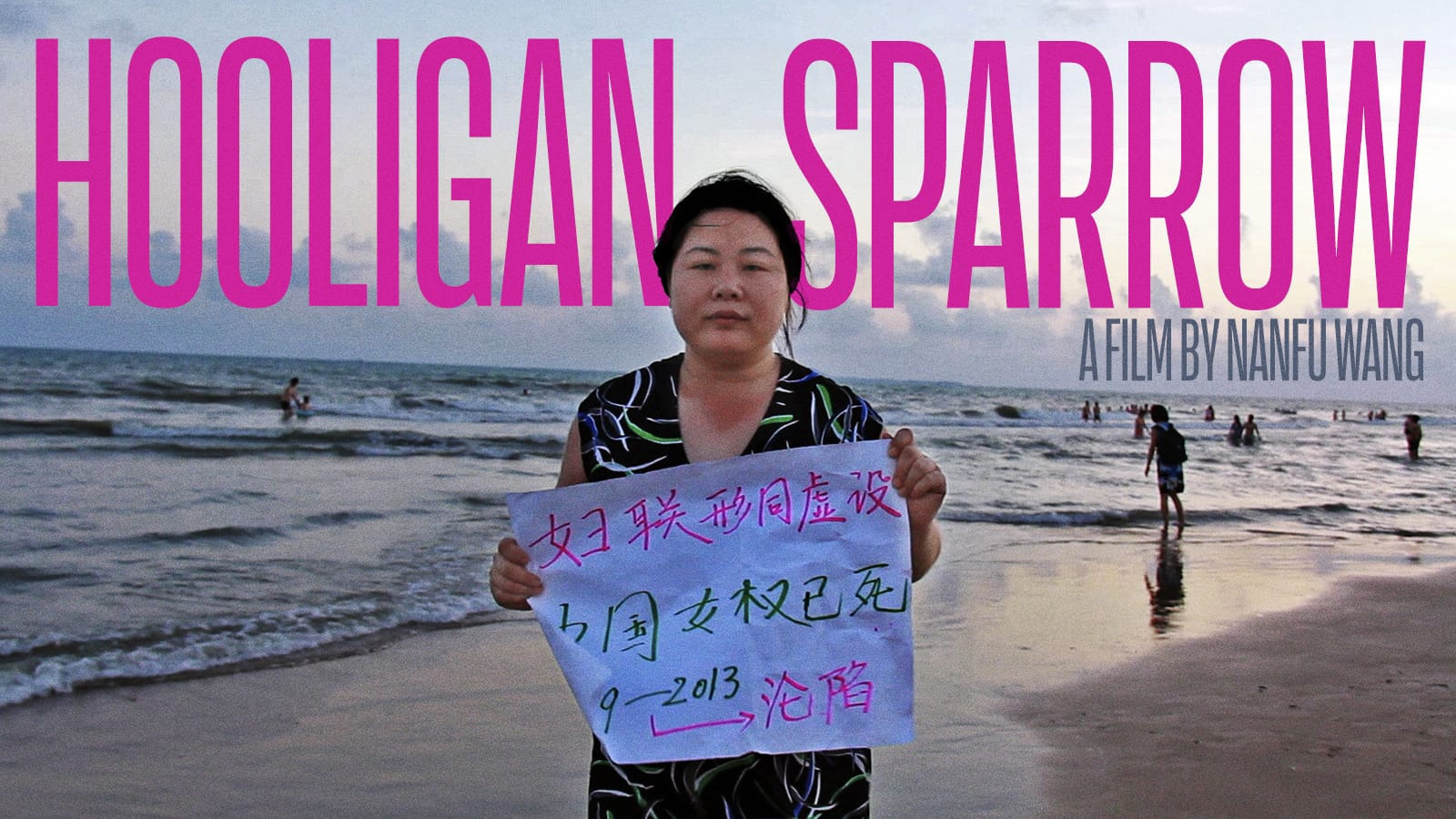
Hooligan Sparrow
WEDNESDAY, MAY 26
Nanfu Wang’s courageous documentary is a gripping dispatch from the front lines of China’s human-rights struggle centering on a fearless feminist activist.
More women filmmakers featured in this month’s programming: Directed by Lois Weber, Dance, Girl, Dance (1940), Wanda (1970), Girlfriends (1978), 575 Castro St. (2009), Stories We Tell (2012), Stray (2013)
SATURDAY MATINEES

Rebecca of Sunnybrook Farm
SATURDAY, MAY 1
The Depression-defying sparkle of Shirley Temple shines bright in this buoyant musical inspired by a beloved children’s novel.

Aparajito
SATURDAY, MAY 8
The second film in Satyajit Ray’s celebrated Apu Trilogy traces a young man’s progression from wide-eyed child to intellectually curious teenager with tender expressiveness.

A Night at the Opera
SATURDAY, MAY 15
The anarchy-inciting Marx Brothers take riotous aim at the pomposity of high society in one of the funniest movies ever made.
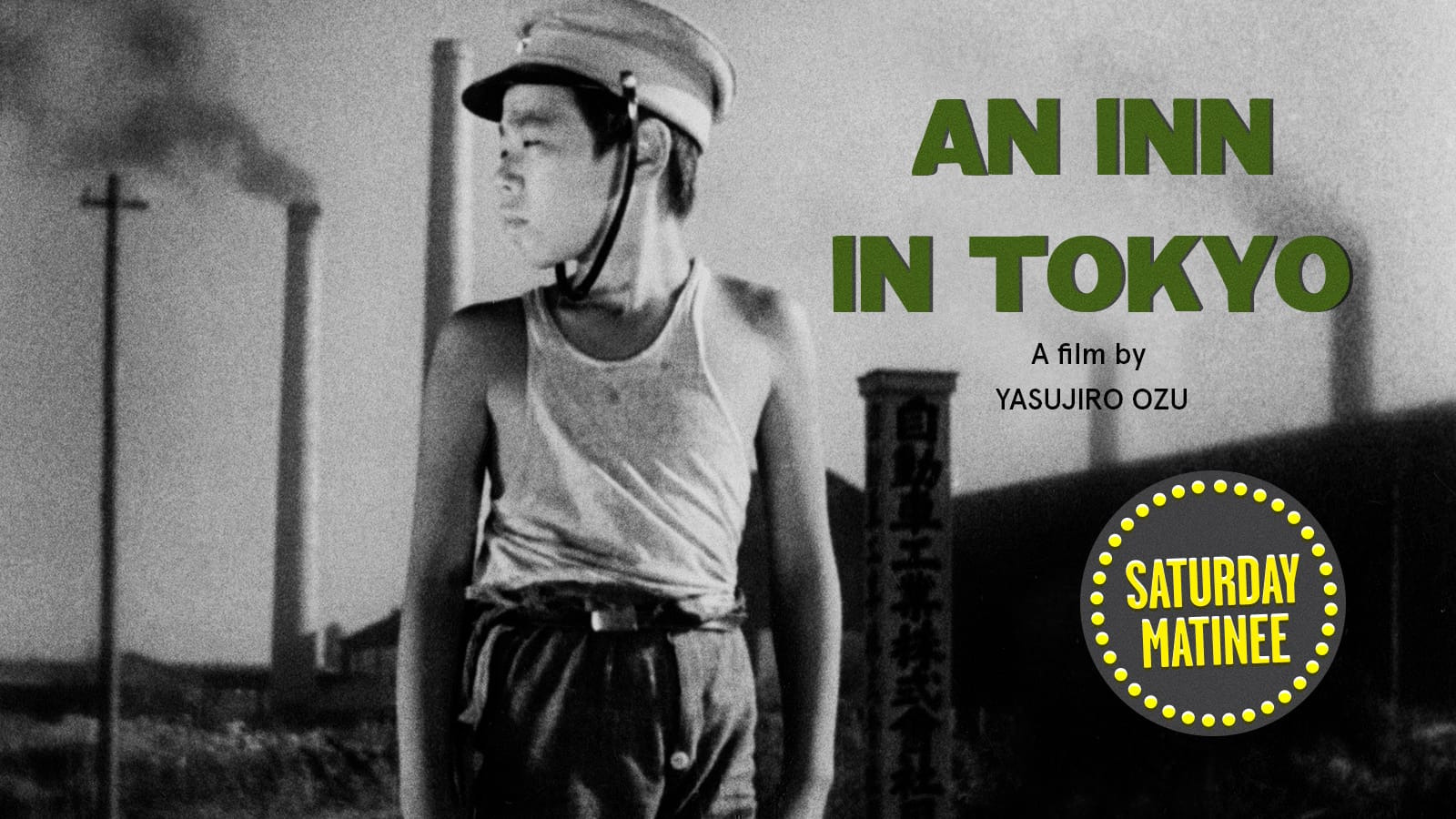
An Inn in Tokyo
SATURDAY, MAY 22
Yasujiro Ozu crafts an exquisitely tender child’s-eye portrait of everyday survival in 1930s Japan.

Oliver Twist
SATURDAY, MAY 29
David Lean’s atmospheric direction brings nineteenth-century London to life in this sterling adaptation of Charles Dickens’s classic.
Short-Film Programs

Short + Feature: Wandering Warriors
Hasaki Ya Suda and Yojimbo
TUESDAY, MAY 4
The enduring fascination with Japanese samurai mythology extends across genres and borders in Akira Kurosawa’s katana-swinging classic and Cédric Ido’s Afrofuturist homage.
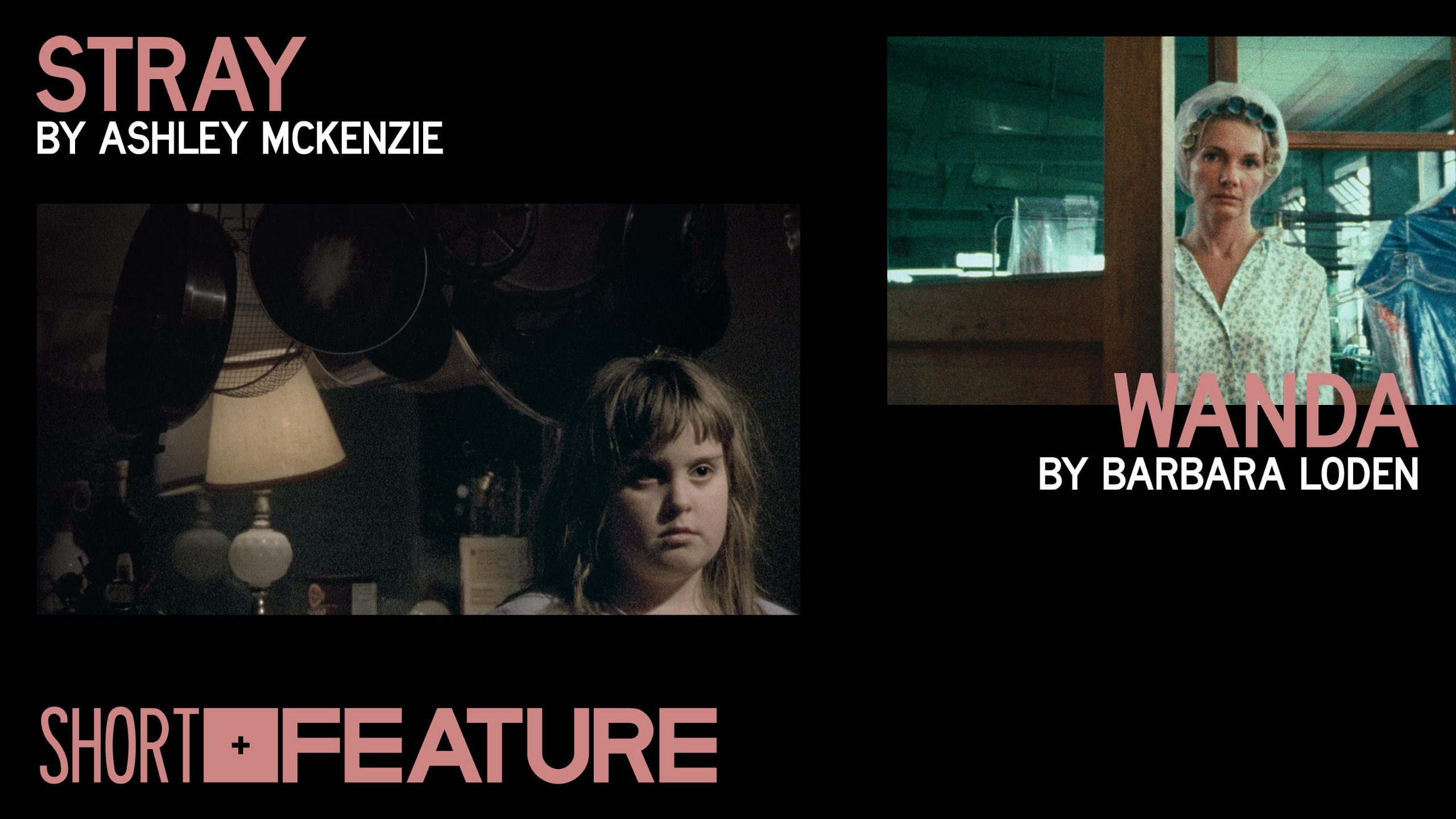
Short + Feature: Ramblin’ Women
Stray and Wanda
TUESDAY, MAY 11
Two vérité visions of female alienation from Ashley McKenzie and Barbara Loden evoke the restless aimlessness of life on the industrial margins of North America.

Short + Feature: Happy Birthday, Harvey
575 Castro St. and The Times of Harvey Milk
TUESDAY, MAY 18
The trailblazing spirit of gay political hero Harvey Milk lives on in these moving tributes to his inspiring legacy.
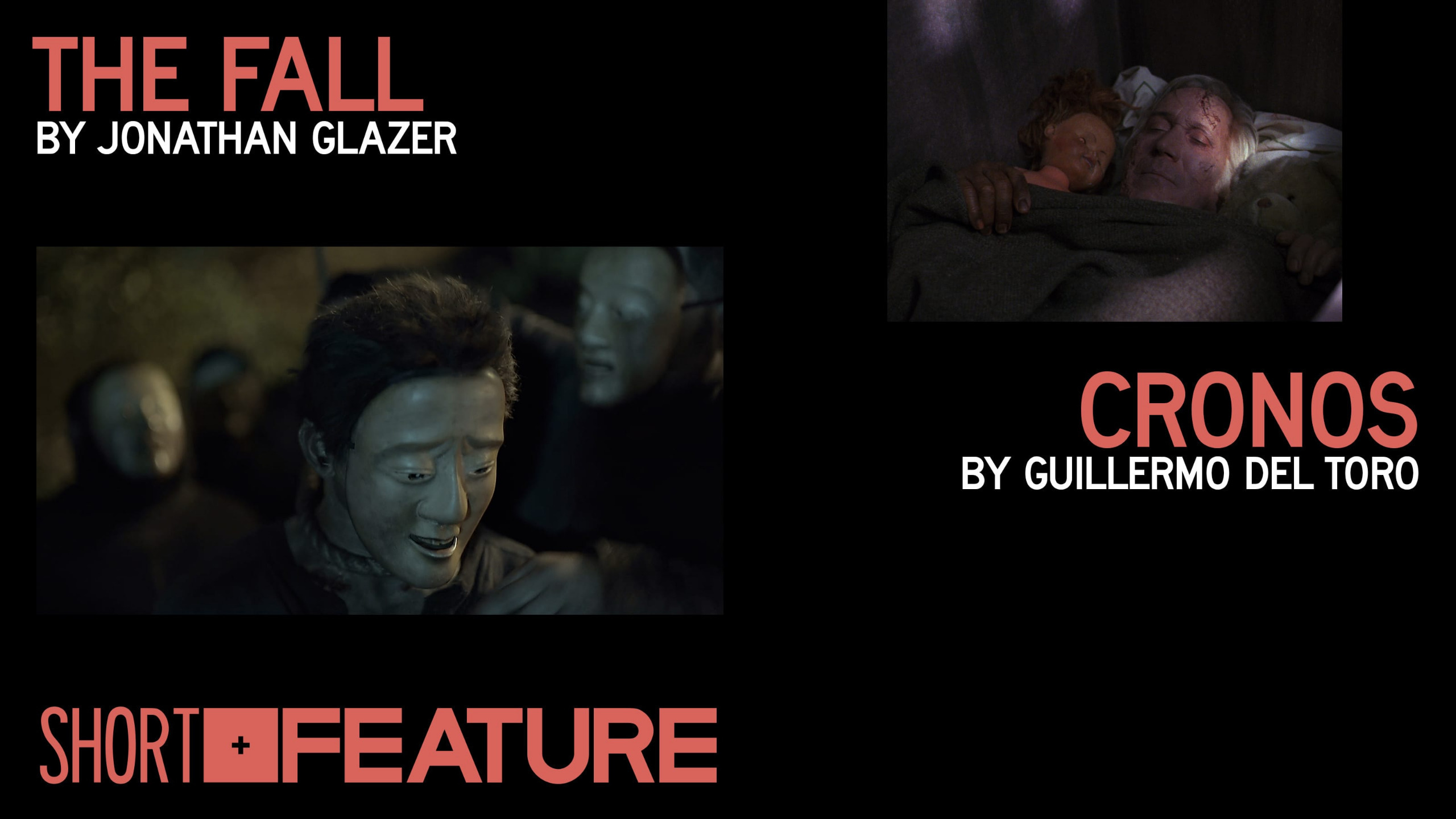
Short + Feature: Goya Gothic
The Fall and Cronos
TUESDAY, MAY 25
The macabre visual imagination of Spanish painter Francisco Goya provides the inspiration for two disturbing journeys into the nightmare realm.
DOUBLE FEATURES

Double Feature: More than a Mother
Ingrid Bergman: In Her Own Words and Stories We Tell
FRIDAY, MAY 7
Spend Mother’s Day with two illuminating explorations of the challenges women face in balancing the demands of motherhood with their complex, often hidden emotional lives.
Double Feature: Military Operations
Patton and MASH
FRIDAY, MAY 14
An Oscar-winning epic and a savagely subversive satire—both released in 1970 at the height of the Vietnam era—take radically different approaches to the depiction of war on-screen.
Double Feature: All Hail the King
A Touch of Zen and The Fate of Lee Khan
FRIDAY, MAY 21
The breathtaking action choreography of Chinese martial-arts master King Hu is on dazzling display in an epic spiritual journey and a whirlwind, women-powered wuxia.
Double Feature: Hopper vs. Hollywood
The Last Movie and Along for the Ride
FRIDAY, MAY 28
Dennis Hopper takes on the establishment in one of the most radical, much-mythologized productions of the 1970s and the behind-the-scenes story of his subsequent exile from Hollywood.
Plus: New Additions to Previous Programs

Now Playing in The Maestro: Scores by Ennio Morricone
Last month we paid tribute to one of cinema’s greatest and most prolific composers with a twenty-three film sampler of art-house masterworks, spaghetti westerns, gialli, and exploitation films scored by Ennio Morricone (1928–2020). That only scratches the surface of the maestro’s massive oeuvre, so we’ve gone back to the vault for seven more—including films directed by John Carpenter, Mike Nichols, Dario Argento, and Elio Petri.
Featuring: A Pistol for Ringo (1965), The Return of Ringo (1965), The Cat o’ Nine Tails (1971), What Have You Done to Solange? (1972), Property Is No Longer a Theft (1973), The Thing (1982), Wolf (1994)

Now Playing in 30 Years of The Film Foundation
In November, we kicked off our thirtieth-anniversary celebration for film-preservation powerhouse The Film Foundation, founded by Martin Scorsese in 1990. This month’s spotlighted restorations include one of Satyajit Ray’s greatest films and a pair of foundational works of African filmmaking by Ousmane Sembène.
Featuring: The Music Room (1958), Borom sarret (1963), Black Girl (1966)



